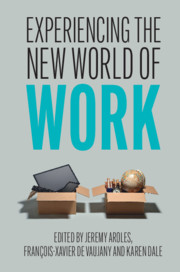Book contents
- Experiencing the New World of Work
- Experiencing the New World of Work
- Copyright page
- Contents
- Tables
- Contributors
- Foreword
- Introduction
- Part I Experiencing at Work
- 1 Embodied Inter-Practices in Resonance as New Forms of Working in Organisations
- 2 Wherever I Lay My Laptop, That’s My Workplace
- 3 ‘So Many Cool Things to Do!’
- 4 Experiencing Making
- Part II Digital Platforms and the New World of Work
- Part III Politics, Imaginaries and Others in the New World of Work
- Conclusion
- Afterword
- Index
- References
1 - Embodied Inter-Practices in Resonance as New Forms of Working in Organisations
from Part I - Experiencing at Work
Published online by Cambridge University Press: 24 December 2020
- Experiencing the New World of Work
- Experiencing the New World of Work
- Copyright page
- Contents
- Tables
- Contributors
- Foreword
- Introduction
- Part I Experiencing at Work
- 1 Embodied Inter-Practices in Resonance as New Forms of Working in Organisations
- 2 Wherever I Lay My Laptop, That’s My Workplace
- 3 ‘So Many Cool Things to Do!’
- 4 Experiencing Making
- Part II Digital Platforms and the New World of Work
- Part III Politics, Imaginaries and Others in the New World of Work
- Conclusion
- Afterword
- Index
- References
Summary
This chapter presents how a phenomenological approach can help developing a more integral and relational understanding of embodied and resonant practices of new work in organisations. Building on seeing work as situationally and temporally placed, the concept of ‘inter-practice’ will be discussed. In such relational practices material, economic and socio-cultural, political dimensions come together. Based on a Merleau-Pontyian inspired phenomenology of embodied practicing, the processual concept of “inter-practice” is presented. Afterword the relational mode of ‘resonance’ as developed by Rosa will be presented and critically discussed and by concluding some implications and perspectives offered.
- Type
- Chapter
- Information
- Experiencing the New World of Work , pp. 13 - 38Publisher: Cambridge University PressPrint publication year: 2021
References
- 1
- Cited by



